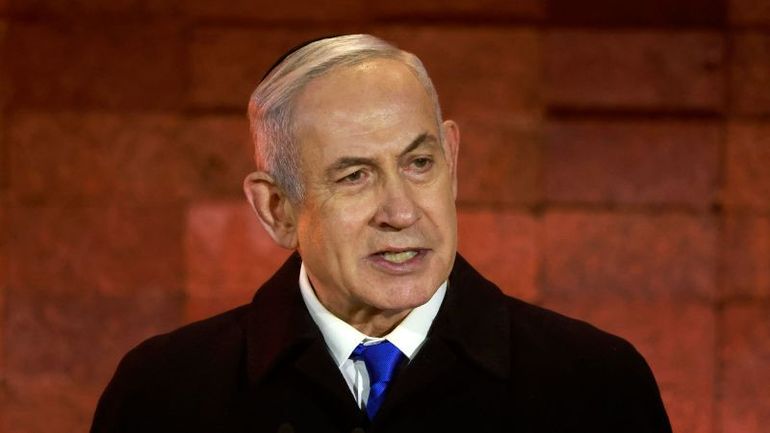
Israeli Prime Minister Netanyahu to Address Congress on June 13 During Biden's Absence

Reports confirm that Israeli Prime Minister Benjamin Netanyahu is set to deliver a speech to Congress on June 13, as President Joe Biden will be away attending an international summit. The scheduled address by Netanyahu comes as US House and Senate leaders make arrangements for the event.
Leaders in the US House and Senate have scheduled Israeli Prime Minister Benjamin Netanyahu to address Congress on June 13, as confirmed by a leadership aide on Monday. This date coincides with President Joe Biden being overseas for a meeting with other world leaders.
Last week, the top four congressional Republican and Democratic leaders invited Netanyahu to speak before Congress. However, it was not initially confirmed whether the prime minister's visit to Washington would also involve a meeting at the White House.
When Biden is overseas in Italy attending a summit of Group of 7 leaders from June 13 to 15, the issue of scheduling his speech seems to be avoided. The dates for this summit have been planned for months.
Despite being on different continents, Biden and Netanyahu have been in regular phone contact since the October 7 attacks by Hamas that triggered the ongoing conflict in Gaza. Their last face-to-face meeting was when the president visited Tel Aviv shortly after the attack.
The leaders' relationship has become tense due to Israel's war plans and humanitarian efforts in the Palestinian enclave.
If Netanyahu visits Washington on June 13, it wouldn't be the first time he has done so without meeting the sitting Democratic president. In 2015, Republicans invited Netanyahu to speak out against the Iran nuclear deal in a speech to Congress, bypassing President Barack Obama's White House.
Obama decided not to meet with Netanyahu because of the upcoming Israeli elections. He also mentioned to reporters that he did not watch the prime minister's remarks.
The invitation for Netanyahu to speak at a joint meeting of Congress this year was not supported by all Democrats. Some Democrats have even pledged to boycott the speech. The conflict in Gaza has caused a division among Democrats, with many believing that Netanyahu is hindering the peace process.
Senate Majority Leader Chuck Schumer had previously suggested new elections in Israel, indicating that Netanyahu should step down. However, despite this, the New York Democrat still agreed to the invitation for the prime minister to address Congress.
In a letter signed by Schumer, Senate Minority Leader Mitch McConnell, House Speaker Mike Johnson, and House Minority Leader Hakeem Jeffries, they expressed their support for Israel in its fight against terrorism. The letter specifically mentioned Hamas holding American and Israeli citizens captive and the destabilizing actions of its leaders in the region.
Biden recently presented a plan from Israel to free hostages held by Hamas in exchange for a ceasefire. This was done in order to try and move forward with the negotiations that had been stuck. The level of detail shared about another country's proposal was uncommon, and it appeared to be a way to challenge Netanyahu to either back the plan or dismiss it as not truly coming from the Israeli government.
Israel has not officially supported the proposal, with Prime Minister Netanyahu stating in the Knesset that they have not agreed to a ceasefire without their conditions being met. He seemed to be talking about the permanent ceasefire mentioned in the second phase of the Israeli proposal.
White House National Security Council spokesperson John Kirby reiterated President Biden's statement that the proposal outlined was indeed an Israeli plan during his conversation with reporters on Monday.
“We’re comfortable that it represents fairly and honestly an Israeli proposal – a very forward-leaning Israeli proposal, and we’re confident that Hamas needs to take it,” he said.
Editor's P/S:
The upcoming address by Israeli Prime Minister Benjamin Netanyahu to Congress on June 13th has sparked controversy and highlighted the complex relationship between the US and Israel. The timing of Netanyahu's speech, coinciding with President Biden's absence in Europe, raises questions about the significance and purpose of his visit. The invitation itself, extended by both Republican and Democratic leaders, reflects the bipartisan support for Israel, but it also exposes divisions among Democrats over Netanyahu's policies.
Amid ongoing conflict in Gaza, Netanyahu's speech is likely to focus on Israel's security concerns and its fight against terrorism. However, the recent proposal put forward by Biden, which Israel has not officially endorsed, has added another layer of tension. The White House's insistence that the proposal represents Israel's position has further complicated the negotiations. As Netanyahu addresses Congress, he will face scrutiny and pressure from both sides of the aisle, highlighting the challenges of balancing US-Israel relations with the complexities of the Middle East conflict.













